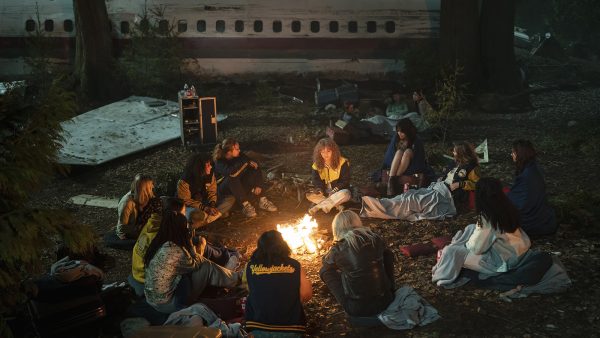“Yellowjackets”, which originally aired on Hulu before transitioning to Netflix on Oct. 1st, is a gripping blend of horror and teen drama.
The series revolves around an all-girls soccer team stranded in the wilderness after a plane crash. Set across two key timelines, the show explores the team’s struggle for survival in the remote Canadian wilderness in 1996, while also delving into the complex lives of the now-adult survivors.
In its dark and twisted narrative, “Yellowjackets” captures the chaos of youth, the terror of isolation, and the looming shadows of midlife crises.
“Yellowjackets” has had a significant impact on queer audiences, resonating with its depiction of complex, nuanced LGBTQ+ characters. One of the show’s standout features is its representation of queer relationships, which are not tokenized or reduced to stereotypes but are instead woven naturally into the fabric of the narrative.
The raw, sometimes brutal portrayal of survival in the wilderness serves as a metaphor for the often-difficult experience of navigating one’s queerness in a society that may be unaccepting or hostile.
The show’s gritty, unapologetic approach to its characters’ lives mirrors the real-world challenges many in the LGBTQ+ community face, adding to its emotional impact and fostering a strong connection with its queer audience.

Dr. Pablo Mendoza, Director of Multicultural Affairs on the University of North Georgia Oconee campus, emphasizes the importance of LGBTQ+ representation in media.
“Such representation is crucial because it helps to make it a normalized part of society. It aids in reaching audiences of youth that may grow up in a rural area and may not have access to that kind of education or exposure.” – Dr. Pablo Mendoza, Director of Multicultural Student Affairs
Aside from the LGBTQ+ representation, “Yellowjackets” discusses the impact of mental health. The show doesn’t shy away from portraying the degradation of mental health as the characters struggle with isolation, starvation and their fear of the unknown, often questioning what’s real and what’s imagined.
Characters like Lottie Matthews embody the complex intersection of mental health and mysticism. Matthews’ mental health journey is particularly intricate, as it intertwines psychological distress with supernatural elements. In the wilderness, she begins to experience visions and premonitions that straddle the line between psychic abilities and symptoms of schizophrenia.
The psychological toll of their ordeal is reflected in their adult lives as they try to suppress, confront or embrace their past. This fragmented view of their experiences brings up questions about the reliability of memory, how trauma is carried through time and how it impacts both identity and relationships.
With “Yellowjackets” now available on Netflix, the show is set to reach an even wider audience. This move opens up the series to viewers who may not have had access before, allowing new fans to immerse themselves in its chilling narrative and multifaceted characters.























